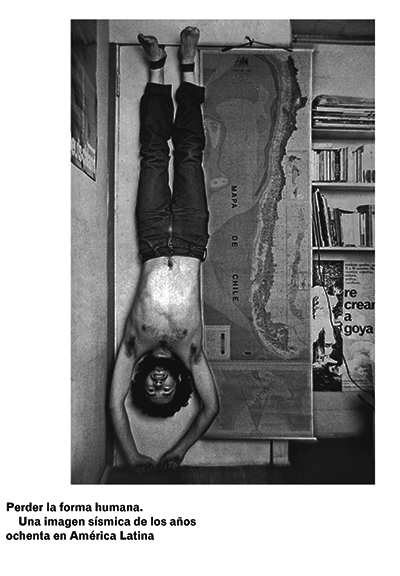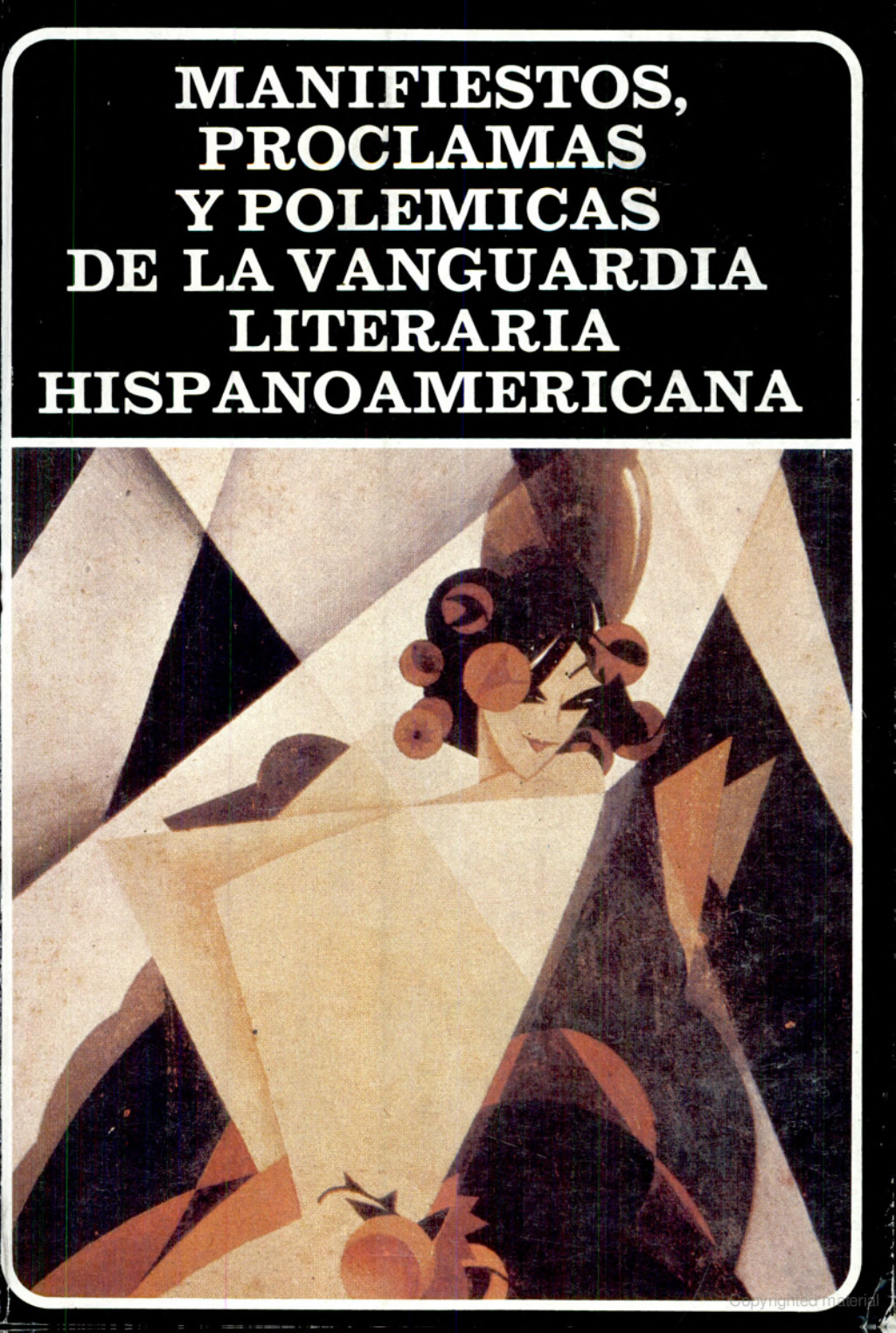Perder la forma humana: una imagen sísmica de los años ochenta en América Latina (2012) [Spanish]
Filed under book | Tags: · 1980s, activism, art history, glossary, latin america

“A glossary tends to be part of an annex appearing at the end of a publication. This book has inverted this logic and structured the entire publication around this tool. The publication is seen as a system that articulates – through relationships of affinity and contagion – a set of key concepts derived from both the lexicon of words and expressions coined by activists and artists during those years and from the anachronistic exercise of reframing these experiences in the light of the present. Each concept incites us to think about those practices, those ways of doing things in art and the politics of the experiences explored. The entries contain references to other categories in the glossary, in which the same experience or common practices can be approached from other perspectives. Furthermore, each entry is accompanied by abundant graphic material, photos and writings from the period, thus forming a profuse and polyphonic documentary base. These key concepts are intended to function as spearheads which, by traversing the material memory of these practices (documents and works of art) and also their immaterial memory (testimonies), give rise to new meanings.”
Published to accompany the exhibition Perder la forma humana [Losing the Human Form. A Seismic Image of the 1980s in Latin America].
“El proyecto editorial Perder la forma humana, ha sido concebido en articulación y diálogo con la propuesta expositiva de igual título. En este sentido, y a diferencia de un catálogo convencional, la publicación no restablece de manera enumerativa trabajos y prácticas presentes en la exposición, sino que se presenta como otro dispositivo (posible) de activación de esas prácticas en una reflexión sobre el presente.
Un glosario suele ser parte de un anexo que se incluye al final de una publicación. Este libro propone invertir esta lógica y estructurar toda la edición en torno a esta herramienta. Es así que la publicación se piensa como un sistema donde se articulan, en relaciones de afinidades y contagios, un conjunto de conceptos clave derivados tanto del léxico acuñado durante aquellos años por activistas y artistas como del ejercicio anacrónico de re-enmarcar estas experiencias a la luz del presente. Cada concepto constituye una entrada para pensar las prácticas, los modos de hacer arte y políticas de las experiencias investigadas. Las entradas contienen referencias a otras categorías del glosario, donde una misma experiencia o prácticas afines pueden ser enfocadas desde otras perspectivas. Por otro lado, cada entrada se completa con abundante material gráfico, fotos y escritos de época, formando una base documental profusa y polifónica. Estos conceptos clave aspiran, en definitiva, a funcionar como puntas de lanza que, al atravesar la memoria material (documentos y obras) e inmaterial (testimonios) de esas prácticas, propongan nuevas tramas de sentido.”
Edited by Red Conceptualismos del Sur
Publisher Museo Nacional Centro de Arte Reina Sofía, Madrid, 2012
ISBN 9788480264624
280 pages
Reviews: Juan Vicente Aliaga (Critique d’art 2012 FR), Horacio Ramos Cerna (Illapa 2013 ES).
Editors
Exhibition (EN)
Exhibition
Exhibition (Museo de Arte de Lima, Peru, 2014)
WorldCat
PDF, PDF (9 MB)
Portuguese trans. of Introduction
Manifiestos, proclamas y polémicas de la vanguardia literaria hispanoamericana (1988) [Spanish]
Filed under book | Tags: · avant-garde, history of literature, latin america, literature, manifesto

“El presente volumen constituye una suma de los textos más importantes mediante los cuales se debatió en toda América Latina el famoso movimiento de las vanguardias artísticas, acción renovadora de sintonía internacional cuyos efectos se hicieron sentir en todos los niveles de la vida social, política y cultural del mundo y de nuestro continente. A la vez, en sus protagonistas hispanoamericanos, acentuó el sentimiento de su condición común. Por ello es necesario dejar de considerar tal movimiento como un mero eco o reflejo de los vanguardismos europeos, para revelar, por el contrario, su consanguinidad continental y universal. El formidable trabajo realizado por Nelson Osorio para la edición de esta obra nos permite contar con una antología única en su tipo, ya que por primera vez se recogen textos programáticos, trabajos modernistas que se articulan al movimiento y documentos no literarios dispersos en numerosas publicaciones de difícil acceso para el lector, verdadero capítulo de las ideas estéticas latinoamericanas en el que se incluyen autores como Amado Nervo, Rubén Darío, Leopoldo Lugones, Luis Llorens Torres, Vicente Huidobro, Jorge Luis Borges, César Vallejo, José Carlos Mariátegui y Magda Portal, entre otros.”
Selected, edited, with introduction, bibliography and notes by Nelson Osorio T.
Publisher Biblioteca Ayacucho, Caracas, Venezuela, 1988
ISBN 9802760633, 9789802760633
xl+417 pages
via Natalie Johnson
PDF (142 MB)
Comment (1)Roberto González Echevarría: Myth and Archive: A Theory of Latin American Narrative (1990–) [EN, ES]
Filed under book | Tags: · anthropology, archive, christianity, city, history, history of literature, latin america, law, literary theory, literature, myth, narrative, rhetoric, violence, writing

“This book offers a theory about the origin and evolution of the Latin American narrative, and about the emergence of the modern novel. It argues that the novel developed from the discourse of the law in the Spanish Empire during the sixteenth century, while many of the early historical documents concerning the New World assumed the same forms, furnished by the notarial arts. Thus, both the novel and these first Latin American narratives imitated the language of authority. The book explores how the same process is repeated in two key moments in the history of the Latin American narrative. In the nineteenth century, the model was the discourse of scientific travellers such as von Humboldt and Darwin, while in the twentieth century, the discourse of anthropology – the study of language and myth – has come to shape the narrative. Professor González Echevarría’s theoretical approach is drawn from a reading of Carpentier’s Los pasos perdidos, and the book centres on major figures in the tradition such as Columbus, Garcilaso el Inca, Sarmiento, Gallegos, Borges and Garcia Marquez.”
Publisher Cambridge University Press, 1990
ISBN 0521023998, 9780521023993
245 pages
Review (Terry J. Peavler, Latin American Research Review, c1990, EN)
Review (Margarita Zamora, Hispanic Review, 1992, EN)
Review (Adriana Gordillo, Fronteras de la historia, 2003, ES)
Publisher (EN)
WorldCat (EN)
WorldCat (ES)
Myth and Archive (PDF), PDF (English, 1990)
Mito y archivo: una teoría de la narrativa latinoamericana (Spanish, trans. Virginia Aguirre Muñoz, PDF, 77 MB, via Academia.edu)

